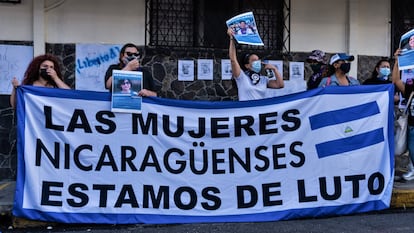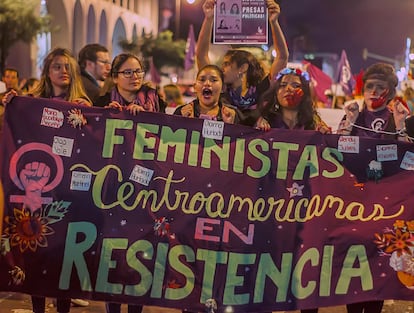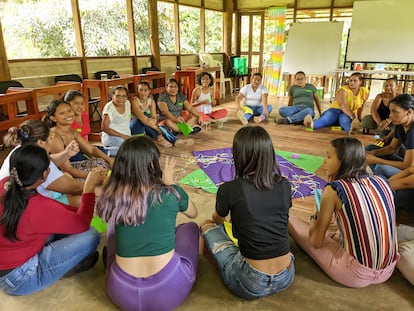Volcánicas, a feminist collective to help Nicaraguan migrants in Costa Rica
The group is a place for exiled women to share their needs and pain. Since 2018, the Costa Rican government has received more than 200,000 refugee applications

Being a woman, a migrant and an exile is not an easy path. Heyling Marenco knows this well. She had to flee Nicaragua for Costa Rica after being persecuted and threatened by the Daniel Ortega regime. She fled on August 4, 2018. Marenco was studying social work, but she was expelled from university for having participated in the anti-government protests that began in April of that year. These mass demonstrations, which were violently repressed, resulted in more than 300 deaths and marked the beginning of the sociopolitical crisis in Nicaragua.
Crossing the border by land into Costa Rica was the easiest option after Nicaraguan authorities denied her ”the right to a passport,” she said. But starting over in Costa Rica was not easy. She was alone in a foreign country, where she initially thought she would only spend three months. Marenco, 29, has now been living in San José for five years. She was granted refugee status in December.
The difficulties she faced were not unlike those experienced by other Nicaraguans who had migrated for similar reasons, such as Génesis Herrera or Ximena Castilblanco, whom she met in San José. The three women began to meet and chat: they talked about their experiences, their needs, and their pain. They were looking for a safe place to share their stories. These meetings gave rise to Volcánicas, a feminist collective founded in 2018, which promotes and defends the rights of Nicaraguan migrant and exiled women in Costa Rica.
The organization was founded by 12 Nicaraguans, all young women, feminists, migrants and exiles. “We have held workshops to provide information about the refugee application processes and the legal process to denounce gender violence […] One of our central themes is healing, because Nicaragua is a historically violent and wounded country. We believe that we cannot change a place without working on the wounds that that place has left us,” says Génesis Herrera, 24, who left Nicaragua in August 2018 after being arrested for protesting in the city of Chinandega and receiving threats from people allied to the regime.

As a collective, Marenco says, they seek to guide and help other women through the processes that they themselves have gone through or are currently experiencing. “The fact that another woman is going through the same thing can be helpful,” she explains. They want to be able to “make visible the experiences of migrant and exiled women in Costa Rica. We are the ones talking about our own stories. It’s not someone alien to our experiences,” says Ximena Castilblanco, 28, the communications coordinator of Volcánicas, who was also exiled for taking part in the anti-government protests.
Historical migration
Nicaraguan migration to Costa Rica goes back a long way. However, since the outbreak of the sociopolitical crisis, it has increased. According to official figures, since 2018, the government of Costa Rica has received more than 200,000 refugee applications.
Until February 2022, according to figures from the U.N. Refugee Agency (UNHCR), the number of Nicaraguans seeking protection in Costa Rica exceeded the total number of refugees and asylum seekers during the 1980s, when Costa Rica became a sanctuary for those fleeing civil war in Central America.
The members of Volcánicas — a name meant to serve as a reminder of Nicaragua, a “land of lakes and volcanoes,” and of each woman’s strength — say that it feels empowering to be able to help migrant women in the same situation.
“It is moving when we meet and go down this migrant path, joining others who have the same demands and needs. It allows us to respond to reality and to be able to rebuild ourselves from there,” says Herrera, who said she found friends who made her experience of adapting to a new country “a process of tenderness and affection.”

Being a co-founder of Volcánicas, is “very powerful and demanding,” says Castilblanco, as it means being part of a collective where “I am a woman with a voice in a space that we created from scratch and where we feel safe.”
For Marenco, the process of going into exile has been very difficult. There was a time when she avoided buying things because it made her feel like she would be staying permanently. But now, she says, she has learned to be in the here and now. “The most beautiful thing for me has been all the learning, feeling supported after many fears, not feeling alone and building this network that in the end is not just us… there are a lot of Nicaraguan women. This community saved my life,” she says.
Now, for them, it is not just about their own stories and needs, but about supporting other Nicaraguan migrant women, asylum seekers and refugees in their processes.
Sign up for our weekly newsletter to get more English-language news coverage from EL PAÍS USA Edition
Tu suscripción se está usando en otro dispositivo
¿Quieres añadir otro usuario a tu suscripción?
Si continúas leyendo en este dispositivo, no se podrá leer en el otro.
FlechaTu suscripción se está usando en otro dispositivo y solo puedes acceder a EL PAÍS desde un dispositivo a la vez.
Si quieres compartir tu cuenta, cambia tu suscripción a la modalidad Premium, así podrás añadir otro usuario. Cada uno accederá con su propia cuenta de email, lo que os permitirá personalizar vuestra experiencia en EL PAÍS.
¿Tienes una suscripción de empresa? Accede aquí para contratar más cuentas.
En el caso de no saber quién está usando tu cuenta, te recomendamos cambiar tu contraseña aquí.
Si decides continuar compartiendo tu cuenta, este mensaje se mostrará en tu dispositivo y en el de la otra persona que está usando tu cuenta de forma indefinida, afectando a tu experiencia de lectura. Puedes consultar aquí los términos y condiciones de la suscripción digital.








































